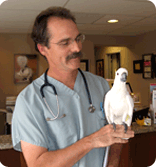Moluccan cockatoo tumor

A friend of mine’s 20-ish yr old Moluccan was just diagnosed with epithelial neoplasia of the humerus. The diagnosis was made by the U. of Davis in CA. Due to the loss of blood and breakdown of the bone they are recommending amputation of the wing and have stated that this type of cancer is very aggressive. While there is no evidence that it has metastasized his prognosis is not good. So now my friend has some very difficult choices to make concerning the quality of life her beloved bird faces. She is trying to absorb this devasating news and locate as much information as she can on this type of
cancer so that she can make an informed decision as to what the future holds for them. Do you have any advice as to questions she should be asking her vet, the oncologist and the team at the University?

Your questions are fair, and intentions are good with this question. Unfortunately, without any more detailed specific information, it would be impossible if not quite misleading for me to provide you with specific answers about the patient in question. Here are some important thoughts to consider though as you help your friend muddle through these issues:
There are a number of different types of cancers that can be found in this area. Epithelial neoplasia is not an accurate enough description, unfortunately. Squamous cell carcinoma, metastatic air sac carcinoma, Osteosarcoma, Fibrosarcoma, etc all would be potentially more accurate descriptions with which to work with. Each of these tumor types has certan behavioral tendencies. Metastasis, overall, with most of these tumors in birds is rare. Treatment options are limited by the size and type of tumor, the location and degree of involvement / invasiveness, the specific type of surgical removal or debulking procedure being considered, the potential benefit for surgical removal, the risk of surgical removal, the potential for non-surgical treatments such as radiation, chemotherapy, or combinations of these options. The overall health and stability of the patient also influences the treatment options being considered. In addition, the behavior of the bird and its interaction in the home environments influence treatments - as a wild and comparatively unhandleable bird may suffer from a much lower quality of life with a wing removed when compared to a pet bird that can be trained and helped to adapt to its new condition(s).
Best suggestions: Sit down and have a talk with the diagnosing clinicians. What is the EXACT diagnosis? What are ALL of the treatment options and relative prognosis / risk with each? What are the relative potential costs with each of these? What do you feel is the best, knowing my bird and myself? (IE: What would YOU do). This last question is one gathering the professional / personal opinions, not necessarily having to be a solid guideline, but does provide helpful information to hear.
If surgery is to be considered - What is the procedure, exactly? How many of these procedures has the surgeon done? Are there other opinions or surgeons that may offer me a better potential success rate?

































